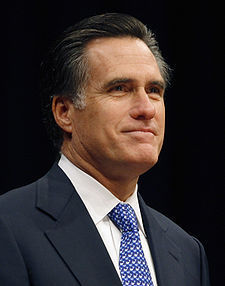Matthew Yglesias's Blog, page 2396
March 9, 2011
Feel The Mittmentum

I joked the other day that once Sarah Palin and Mike Huckabee decide not to run for president, the only thing standing between Mitt Romney and the GOP nomination will be his religion and his record as governor. I know a lot of people think the record will suffice to doom him—this Jon Chait's Tim Pawlenty call—but I'm not so certain. I think it's worth recalling that Mitt Romney won National Review's endorsement in 2008 explicitly on the theory that he was equally conservative as Fred Thompson and more conservative than the others. Rush Limbaugh also endorsed him. Romney certainly hasn't become less conservative in the ensuing time, and well-informed elites were prepared to accept him four years ago. Scott Brown's support for RomneyCare didn't stop him from becoming a conservative icon and hero of the Lost Cause struggle against the Affordable Care Act.
The known unknown here is whether key conservative media figures who supported Romney in the past would still like him today. If they do, they'll help sell the right on his rationalizing away of his Commonwealth Care problem, and will likely have some efficacy. If they don't and decide to (accurately) characterize his record as one of supporting something similar to the Affordable Care Act, then he's clearly toast. But I think this is an open question. See also Brendan Nyhan defending Romney against what he sees as media smears.
The religion thing seems like a bigger deal to me. National Review is dominated by Catholics with intellectual/theological commitments to social conservatism. To someone like that, a Mormon is as good an ally as anyone else. But my suspicion is that this way of looking at the issue might not hold up for the non-liturgical Protestants who make up so much of the GOP primary vote. From an identity politics standpoint, Pawlenty is "one of us" and Romney isn't. Evangelicals are badly underrepresented among conservative writers relative to their weight in the primaries, so I think it's easy for this to get lost. But even though anti-Mormon sentiment will be a drag on Romney, it's not obvious that any one person in particular can capitalize on it. So to me it really circles back to whether radio hosts will buy Romney as a conservative, which I think they might.


The War On Peter Diamond

As you read Alabama Senator Richard Shelby's reasons for refusing to allow a Senate vote on the confirmation of Peter Diamond to the Federal Reserve Board of Governors, keep in mind that Diamond recently won a Nobel Prize:
The top Republican on the Senate banking panel made clear Tuesday that he still opposed the nomination of the M.I.T. professor and Nobel laureate, Peter A. Diamond, to the Federal Reserve calling him an "old-fashioned" Keynesian supporter of big government.
Opposition from Senator Richard C. Shelby of Alabama to a nomination that Republicans have already scuttled twice poses a challenge to President Obama, who must decide how much political capital he wants to spend to push for Mr. Diamond's approval.
"It is clear to many of us that he does not possess the appropriate background, experience or policy preferences to serve," on the Fed's board, Mr. Shelby said of Mr. Diamond.
It's true that Diamond isn't a specialist in monetary economics, but this has never been the confirmation standard before. Indeed, as Steve Benen reminds us the Bush administration appointed several non-economists to the Fed board and nobody complained. Diamond, meanwhile, has both a PhD in economics and a Nobel Prize. And while he's not a monetary policy specialist he does have extensive (indeed, Nobel Prize winning) research in the field of labor markets and the sources of unemployment. Note also that the Federal Reserve has no particular authority over the size of government, so the fact that Diamond is a well-known advocate of Social Security has no clear relevance to this issue.
In terms of political capital, I think this is a place where the metaphor is misleading. Political standing is a renewable resource. Dedicating some attention to the fact that Richard Shelby (JD, University of Alabama) is keeping a key economic policymaking post vacant amidst a severe labor market recession on the grounds that a Nobel Prize winning economist is unqualified is not going to deplete Obama's store of anything valuable. Obama probably can't force Shelby to relent, but picking a fight over his unwillingness to permit an up or down vote on this matter would be a nearly optimal way of highlighting a general trend toward obstructionism. Monetary policy is also one of the very most important determinants of Obama's re-election prospects, so it would be a mistake to slight this.


Oil: When Inelastic Demand Meets Inelastic Supply

(cc photo by M Glasgow)
I saw on TV the other day an anchor being puzzled about how disruption of a relatively small share of world oil supply in Libya could be producing huge price swings. I think Kevin Drum has this right "World oil prices are largely driven by spare capacity these days. When it gets down to around a million barrels a day, where it seems to be now, prices can gyrate wildly based on very small supply shocks."
Basically, we've reached a point where neither supply nor demand has much elasticity in the short-run so prices can swing around enormously.
To pivot a bit, the fact that we keep having this conversation about once a year during price spikes is one of the reasons I join Noah Smith in frustration that economists are too quick to gesture at "technology" as the source of all our problems. Why not look at some concrete, specific problems? The United States leaves itself persistently more vulnerable to oil price shocks than any other country. And yet the technology to insulate ourselves—lighter cars, smaller lots, buses, tall building near rail stations—we're just not deploying it thanks to a set of tax and regulatory policies based on an outmoded industrial policy from an era when American auto companies ruled the world and the US was a net oil exporter. This isn't the source of all our problems either, but it's concrete and solvable and it's certainly not part of the solution.


Jobless Recoveries Are Caused By Weak Growth
Scott Sumner says there's nothing mysterious about "jobless recoveries," they're just weak recoveries:

The thing we seem to have forgotten is that the end of a recession used to be associated with really fast GDP growth, not just a return to normal levels of growth. And that makes sense. If you've got a full employment economy, increasing output is hard. You need to apply more capital or think up new ideas. But if you've got 9-10 percent of your labor force not working then it's easy to increase output—you need those unemployed people to do, well, something. Anything! So rapid increases in real output from the trough of a recession are both possible (because there are all these idle workers) and necessary (because absent rapid output growth the idle workers won't get jobs) but we've forgotten how to step on the gas hard enough.


Peter King, Terrorist Sympathizer

Well-done by Scott Shane in The New York Times:
"We must pledge ourselves to support those brave men and women who this very moment are carrying forth the struggle against British imperialism in the streets of Belfast and Derry," Mr. King told a pro-I.R.A. rally on Long Island, where he was serving as Nassau County comptroller, in 1982. Three years later he declared, "If civilians are killed in an attack on a military installation, it is certainly regrettable, but I will not morally blame the I.R.A. for it." [...]
Of comparisons between the terrorism of the I.R.A. and that of Al Qaeda and its affiliates, Mr. King said: "I understand why people who are misinformed might see a parallel. The fact is, the I.R.A. never attacked the United States. And my loyalty is to the United States." [...]
Mr. Parker was at a birthday party for a friend in London in 1990 when the I.R.A. tossed a bomb onto the roof of the rented hall, a historic barracks. Many people, including Mr. Parker, were injured, but none died, by lucky chance of location and quick medical response, he said.
Clearly, yes, the IRA (like, say, Hamas) focused its violence against a specific national enemy rather than against the United States of America. Equally clearly, if you toss enough bombs at enough birthday parties in London, you're going to kill Americans sooner or later.


What About Singapore?

Tyler Cowen, discussing the sins of left-wing economists, says "Classical liberals are increasingly facing up to the enduring successes of the Nordic nations. There is not always a similar reckoning with the successes of Chile and Hong Kong and Singapore; often this is a sin of omission."
I can't say much about Chile and Hong Kong, but to me the striking thing about Singapore is how fundamentally similar it is to the Nordic countries in a lot of ways. People often see it as being all the way on the other end of the spectrum since the formal tax burden is so low. But this seems to me to largely be an artifact of the fact that the 35.5 percent Central Provident Fund contribution rate isn't counted as a tax. So, okay, that's not a tax it's an individual mandate to save. But as we've learned lately with the health care debate, the distinction between taxes and mandates is a bit fuzzy. I also frequently here the CPF invoked in the context of conservative schemes to privatize Social Security, but as you might have guessed from the name there's nothing "private" about the Central Provident Fund. This is a government agency. The basic structure is similar to an idea Tyler Cowen put in his "would likely lead to massive socialism" file.
Which is all to say that Singapore seems to have achieved some enviable results in public policy, may well be on the cutting edge of sound welfare state design in many respects, but is very much a country with a large welfare state. And of course if you look at it from the other side Norway, like Singapore, runs a large sovereign wealth fund. Denmark and Finland, like Singapore, make it very easy to start a new business. Sweden and Denmark, like Singapore, have privatized the provision of a lot of public services. I don't think it's a coincidence that Stockholm and Singapore are leading the way on congestion pricing. These are all small countries that put a premium on well-managed public sector. We should probably all learn more about what they're doing, but it's important to really learn about what's happening. In my experience, references to Sweden's school vouchers or Singapore's private accounts tend to obscure large differences between the programs in question and the US policy proposals.


March 8, 2011
Endgame
Let's dance while we're waiting:
— Semi-recommended by Paul Krugman.
— Democrats touting Wisconsin recall signatures.
— Conservatives succeeding in disenfranchising college students.
— Rick Santorum won't judge Newt Gingrich over infidelity.
— Sweden's (privatized) postal service says goodbye ot stamps.
Lykke Li, "Love Out Of Lust".


Olympia Snowe Should Have Voted For The Affordable Care Act

After all, failure to do so doesn't seem to have endeared her to Maine conservatives:
It's been clear for a long time now that Maine Republicans want to swap out Olympia Snowe for someone more conservative. Our newest poll in the state finds that hasn't changed: only 33% of primary voters in the state say they would support Snowe next year to 58% who prefer a generic 'more conservative candidate.'
The gripe with Snowe is pretty straight forward. 58% of primary voters think she's too liberal to 37% who think she's ideologically where she should be. Most GOP voters don't really think Snowe belongs in their party- 34% think she ought to be an independent, 33% think she should be a Democrat, and only 27% feel that the GOP is indeed her rightful place.
A "yes" vote would have positioned her for a timely party switch, or a move to become an independent and hope the Democrats don't mount a serious candidate against her. But as things stand, she's mired in a kind of no-man's land—she voted, in committee, for a tyrannical individual health care mandate but at the end of the day she stood against Barack Obama's signature initiative. What's keeping her alive right now is there's no really solid conservative candidate in the field against her, but that may not be enough and it may not hold up.


The Ethic of Responsibility
Anne Applebaum gets this right on Libya:
It's nice to be on the right side of history, and I'm not surprised that George W. Bush's remaining supporters now feel good about the "freedom agenda" that he sometimes advocated and sometimes forgot while in office. But being right, even morally right, isn't everything. It is also important to be competent, to be consistent, and to be knowledgeable. It's important for your soldiers and diplomats to speak the language of the people you want to influence. It's important to understand the ethnic and tribal divisions of the place you hope to assist. Let's not repeat past mistakes: Before sending in the 101st Airborne, we should find out what people on the ground want and need. Because right now, I don't hear them clamoring for us to come. They are afraid of what American "assistance" might do to their country.
This is the "ethic of responsibility" approach. What's wanted on Libya aren't bold ideas to fix things that are as likely as not to end up creating some new horrible problems, it's modest ideas that we can be reasonably certain will actually help. Of course it sounds good to write articles decrying someone else's fecklessness, but we should be very reluctant to initiate military actions just because nobody can think up a better lead for a column.


Us and the Canadians
Karl Smith writes:
Contrary to Jonah Goldberg and others who see Canada and the United States as examples of two clashing ideologies, they are actually examples of two different ethic distributions. The United States is not Canada because there is ethnic strife between Southern Blacks and Southern Whites. That strife reduces the sense of moral obligation on the part of the white majority and so reduces government spending.
I don't think that's quite the right story. My understanding of the situation is that public opinion in Anglophone Canada and the non-southern United States is extremely similar. You may recall this old map of the United States of Canada vs Jesusland:

This is a mistake, but it captures a certain truth. Generally speaking, if you look at a Canada-adjacent part of the United States and compare it to the part of Canada right across the border, you see a lot of cultural similarity. And on both sides of the border there are differences between the big cities and the rural areas. But Québec is quite different from Anglophone Canada and in the USA "the south is different." The interesting thing is that not only do Québécois people speak French, they also have unusually left-wing views on economic policy. Meanwhile, white southerners have more rightwing views on economic policy than do other North American white Anglophones. If you redrew the borders, you'd get very different political outcomes.


Matthew Yglesias's Blog
- Matthew Yglesias's profile
- 72 followers



